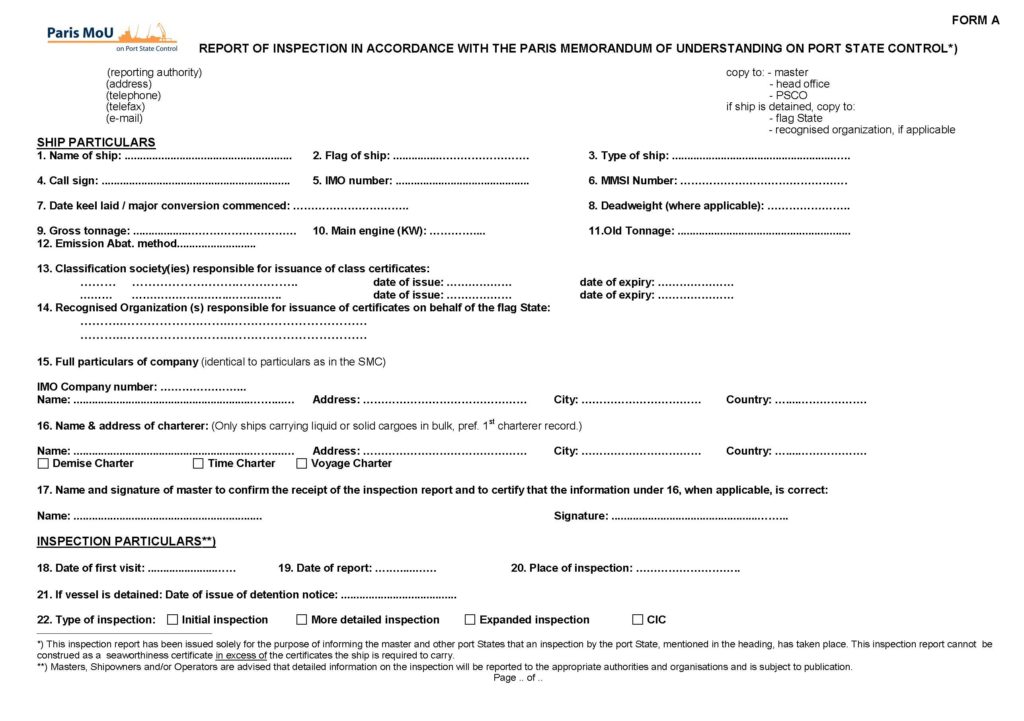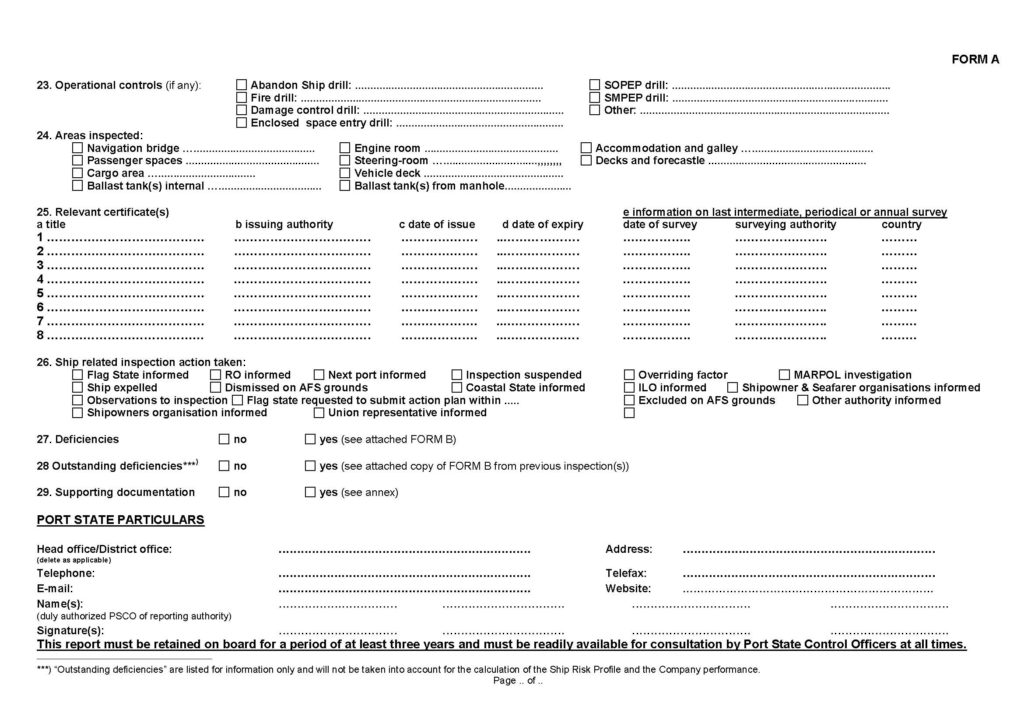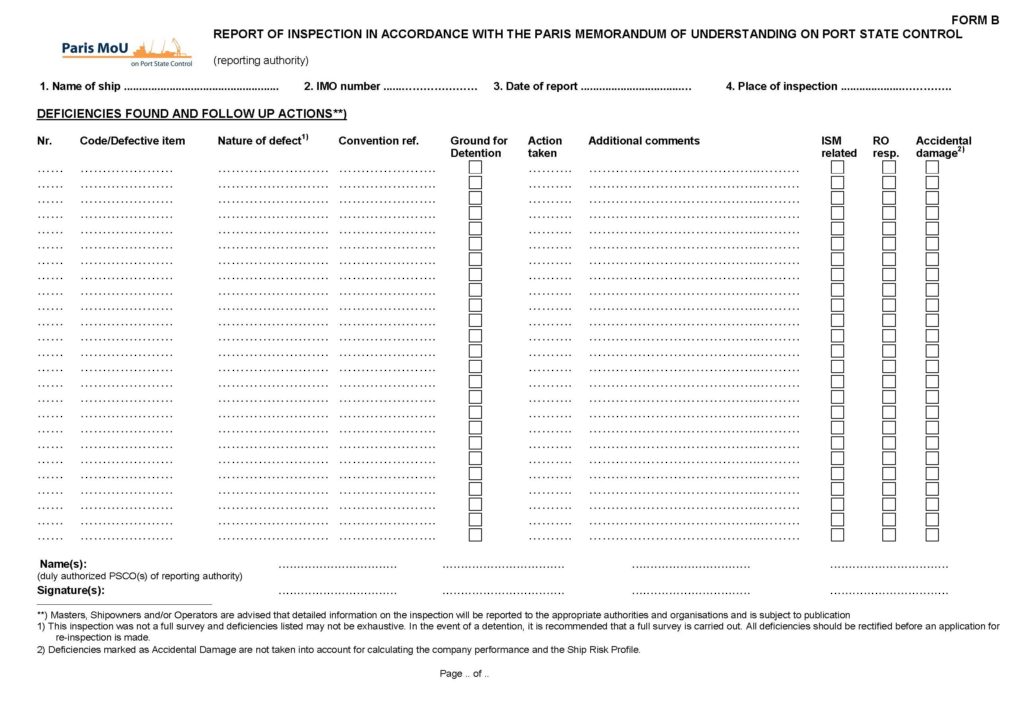Deficiencies
During an inspection the PSC inspector may identify one or more deficiencies and include these in the PSC inspection report. Each deficiency has a unique code.
In the FORM B, it is also mentioned when the deficiency should be rectified. With all deficiencies, the applicable convention reference should be included.
With the deficiency there will also be an “action taken” specified. The list below contains the most frequently used “action taken” code:
Rectified (code 10)
Used for a deficiency which has been rectified and verified by a PSCO
To be rectified at next port (code 15)
Used for a deficiency which cannot be rectified before departure but which the PSCO requires the rectification at the next port
This action requires that the deficiency is rectified at the next port. It is possible that the repair work or delivery of equipment may take place during the ship’s stay in that port.
To be rectified within 14 days (code 16)
Used for a deficiency which, in the PSCO’s professional judgement, is not serious enough to require urgent rectification or verification by a PSCO before departure.
This action taken sets a maximum limit of 14 days but it is left to the master’s responsibility to rectify the deficiency as soon as necessary and reasonable within that period.
To be rectified before departure (code 17)
Used for a deficiency which:
should be rectified before the ship sails but is not serious enough to warrant detention, or/and can reasonably be rectified before the ship sails.
If the ship is not detained it is left to the master’s responsibility to rectify the deficiency before departure. No verification by a PSCO is required (at that port call).
If a deficiency which is to be rectified before departure is verified by a PSCO as rectified before the ship departs it should be recorded as rectified.
(code 19) Safety management audit by the Administration is required before departure of the ship
Safety management audit by the Administration is required before departure of the ship. Deficiency(s) marked ISM is (are) objective evidence of a serious failure, or lack of effectiveness, of implementation of the ISM Code.
Corrective action taken on the ISM system by the Company is required within 3 months (code 21)
Corrective action taken on the ISM system by the Company is required within 3 months. Deficiency(s) marked ISM is (are) objective evidence of a failure, or lack of effectiveness, of the implementation of the ISM Code. The ship will be eligible for re-inspection after 3 months from the final date of the report.
Competent Security Authority informed (code 26)
Used only for a deficiency of the Security code series where the competent security authority of the PSCO’s State is informed that clear grounds have been found in accordance with the PSCCInstruction Guidelines on Security.
Grounds for detention (code 30)
Used for a deficiency that is serious enough that it should be rectified before departure and reviewed by the PSCO before the ship may continue its voyage.
Used for each detainable deficiency that is determined, in accordance with a PSC Instruction on Criteria for Responsibility Assessment of Recognized Organizations (R/O) should be related to the Recognized Organization that issued or endorsed the statutory certificates related to the detainable deficiency.
PSC Reporting FORM A
Will be issued to all ships which has been inspected by PSC inspector.
PSC Reporting FORM B
This form will be accompanied with FORM A when the vessel has been inspected and some observations has been found, deficiency alongwith deficiency code and action code will be mentioned by PSC inspector.
Deficiency Codes
Each deficiency have a unique code to easily identify the items related to, following below are some examples:-
011 – Certificates & Documentation – Ship Certificate
01101
Cargo ship safety equipment (including exemption)
01102
Cargo ship safety construction (including exempt.)
012 – Certificates & Documentation – Crew Certificate
01201
Certificates for master and officers
01202
Certificate for rating for watchkeeping
013 – Certificates and Documentation – Document
01302
SAR co-operation plan for pass.ships on fixed trade
01303
Unattended machinery spaces (UMS) evidence
02 – Structural condition
02101
Closing devices/watertight doors
02102
Damage control plan
03 – Water/Weathertight condition
03101
Overloading
03102
Freeboard marks
04 – Emergency Systems
04101
Public address system
04102
Emergency fire pump and its pipes
05 – Radio communication
05101
Distress messages: obligations and procedures
05102
Functional requirements
06 – Cargo operations including equipment
06101
Cargo securing manual
06102
Grain
07 – Fire safety
07102
Inert gas system
07103
Division – decks, bulkheads and penetrations
08 – Alarms
08101
General alarm
08102
Emergency signal
09 – Working and Living Conditions
091 – Working and Living Conditions – Living conditions
09101
Minimum age
09102
Dirty, parasites
092 – Working and Living Conditions – Working Conditions
09201
Ventilation (Working spaces)
09202
Heating
10 – Safety of Navigation
10101
Pilot ladders and hoist/pilot transfer arrangements
10102
Type approval equipment
11 – Life saving appliances
11101
Lifeboats
11102
Lifeboat inventory
12 – Dangerous Goods
12101
Stowage/segregation/packaging of dangerous goods
12102
Dangerous liquid chemicals in bulk
13 – Propulsion and auxiliary machinery
13101
Propulsion main engine
13102
Auxiliary engine
14 – Pollution Prevention
141 – Pollution Prevention – MARPOL Annex I
14101
Control of discharge of oil
14102
Retention of oil on board
142 – Pollution Prevention – MARPOL Annex II
14201
Efficient stripping
14202
Residue discharge systems
143 – Pollution Prevention – MARPOL Annex III
14301
Packaging
14302
Marking and labelling
144 – Pollution Prevention – MARPOL Annex IV
14402
Sewage treatment plan
14403
Sewage comminuting and disinfecting system
145 – Pollution Prevention – MARPOL Annex V
14501
Garbage
14502
Placards
146 – Pollution Prevention – MARPOL Annex VI
14601
Technical Files and if applicable, monitoring manual
14602
Record book engine parameters
147 – Pollution Prevention – Anti Fouling
14701
AFS supporting documentation
14702
Logbook entries referring AFS
148 – Pollution Prevention – Ballast Water
14801
Ballast Water Management Plan
14802
Ballast Water Record Book
15 – ISM
15150
ISM
16 – ISPS
16101
Security related defects
16102
Ship security alert system
18 – MLC, 2006
181 – Minimum requirements to work on a ship
18101
Minimum age
18102
Night working
182 – Conditions of employment
18201
Fitness for duty – work and rest hours
18202
Legal documentation on work and rest hours
183 – Accommodation, recreational facilities, food and catering
18301
Noise, vibration and other ambient factors
18302
Sanitary Facilities
184 – Health protection, medical care, social security
18401
Medical Equipment, medical chest, medical guide
18402
Access to on shore medical doctor or dentist
99 – Other
99101
Other safety in general
99102
Other (SOLAS operational)
99103
Other (MARPOL operational)
Appeal procedure
National appeal
When deficiencies are found which render the ship unfit to proceed or that poses an unreasonable risk to the environment, the ship will be detained. The PSCO will issue a notice of detention to the master.
The PSCO will inform the master that the ship’s owner/operator has the right of appeal.
Detention review procedure
In case an owner or operator declines to use the official National appeal procedure but still wishes to complain about a detention decision, such a complaint should be sent to the flag State or the Recognized Organization, which issued the statutory Certificates on behalf of the flag State.
The flag State or R.O. may then ask the port State to reconsider its decision to detain the ship.
If the flag State or the R.O. disagrees with the outcome of the investigation as mentioned above, a request for review may be sent to the MOU Secretariat.
Concentrated Inspection Campaigns (CIC)
Regional PSC MOU members will agree to carry out concentrated inspection campaigns from time to time for periods of usually three or four months. These campaigns are often announced beforehand through press releases and other means and generally focus on certain aspects of ship safety. Past inspection campaigns have focused on such areas as follows:
- MLC, 2006
- Structural Safety and Load Lines
- Cargo Securing Arrangements
- Tanker Damage Stability
- Crew Familiarization for Enclosed Space Entry
- Harmful Substances Carried in Packaged Form
- STCW Hours of Rest
- Lifeboat Launching Arrangements
- Propulsion and Auxiliary Machinery
- Safety of Navigation
- Fire Safety Systems
- ISM Code


